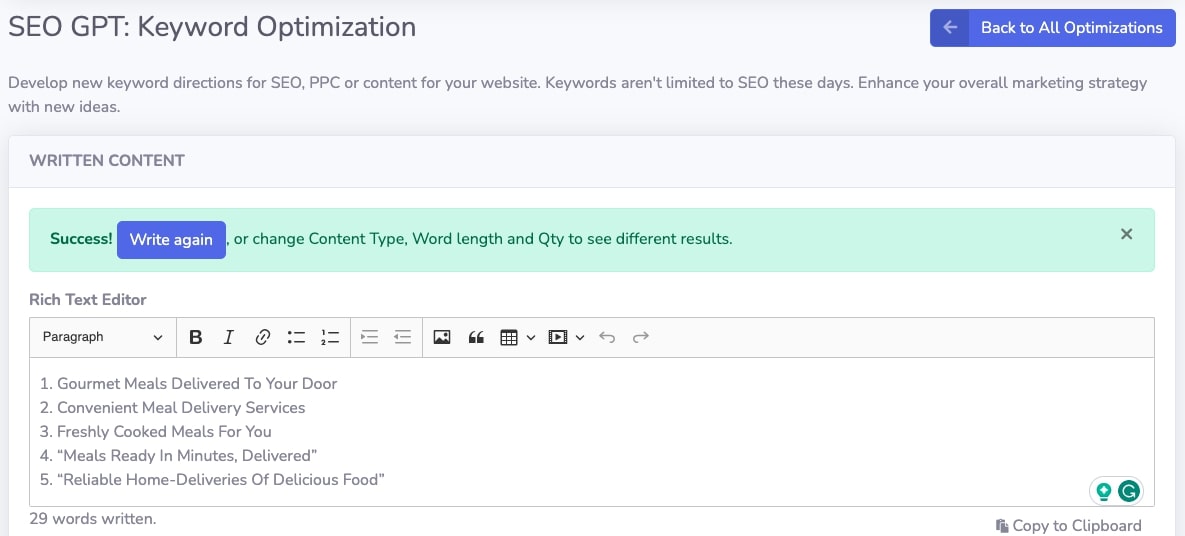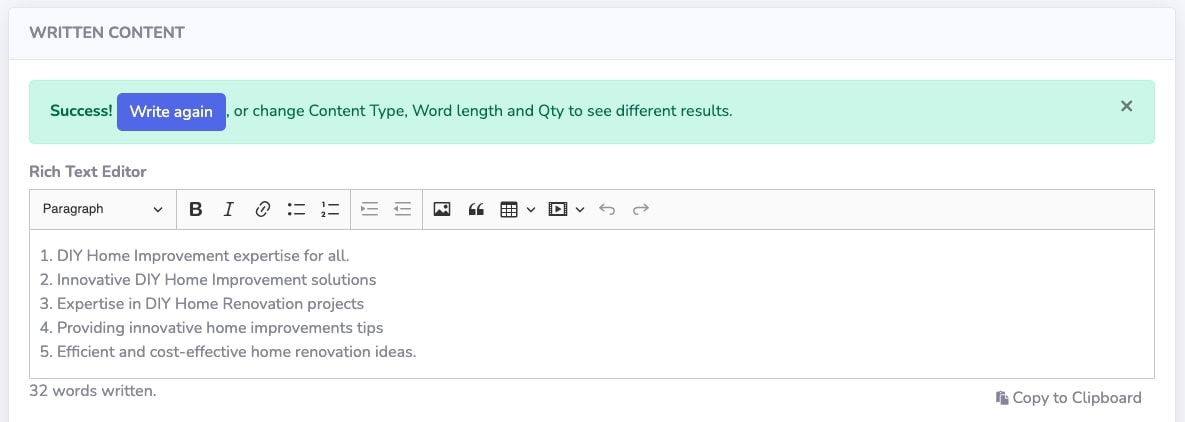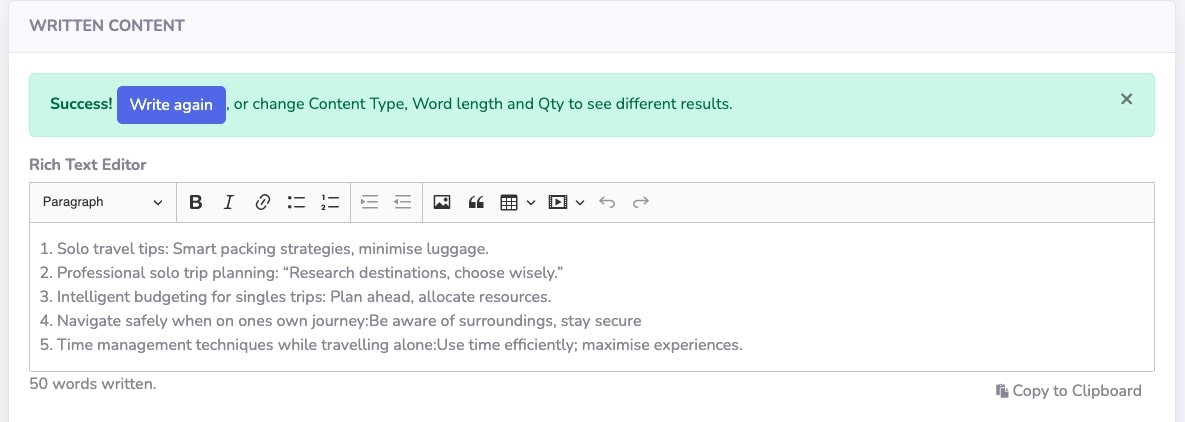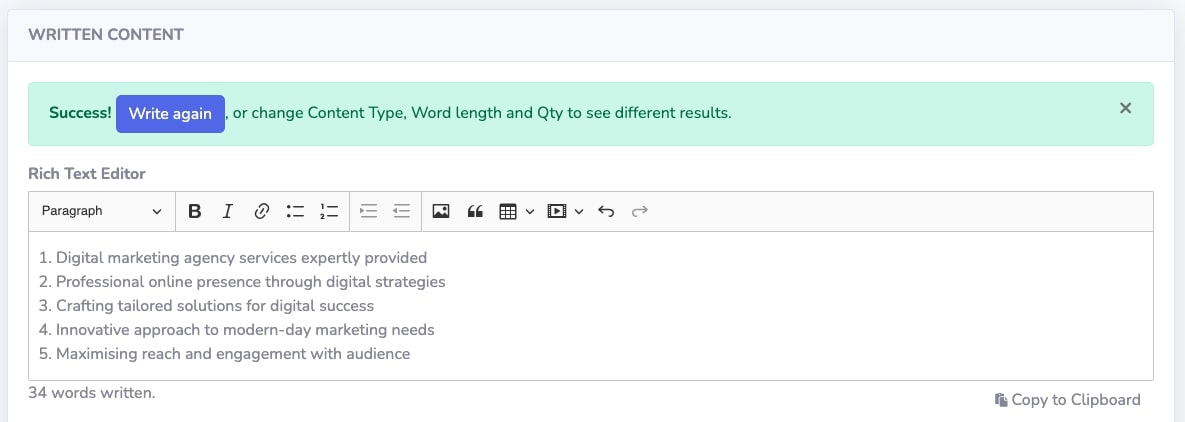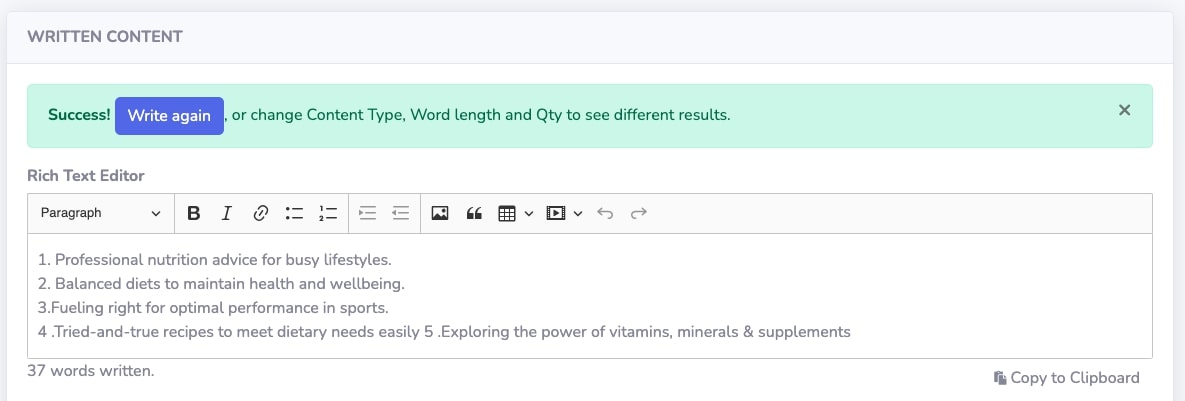Keyword optimization is a crucial aspect of any successful digital marketing strategy. Whether you’re focused on SEO, PPC, or content marketing, identifying and utilizing the right keywords can significantly impact your online visibility and overall success.
One tool that can greatly assist you in this endeavor is SEO GPT. Its ‘Keyword Optimization’ feature enables you to explore and discover up to 23 different types of keywords for your campaigns.
The Importance of Optimizing Your Keywords
Keyword optimization is not just a minor component of your digital marketing strategy; it is, in fact, the cornerstone of your online success. Here are several reasons why optimizing your keywords is of paramount importance:
- Improved Search Engine Visibility: Using strategic keyword optimization ensures a higher Google rank and, thus, increased organic traffic to your site. This is essential to running any professional business as it increases exposure and generates more profits.
- Targeted Traffic: Optimizing keywords properly helps you draw in quality traffic genuinely interested in what your business has to offer. You can ensure more effective conversions or reader engagement through accurate alignment with the interests and needs of your target audience.
- Competitive Advantage: With strong keyword optimization, you can gain a competitive edge in their industry. By ensuring keywords are up-to-date and relevant to customers’ search habits, you stand out from the competition and stay ahead of the game, enabling you to increase revenue and market share.
- Enhanced User Experience: Keyword optimization can create more valuable, relevant, and informative content for audiences. By tailoring this content to match user intent, you can provide an enhanced experience that results in higher engagement on your website with decreased bounce rates and increased time spent browsing the site.
- Better ROI in PPC Campaigns: To achieve a higher ROI on PPC campaigns, keyword selection and optimization must be done carefully. This includes selecting the appropriate keywords relevant to your target audience, writing effective ad copy with an enticing call-to-action (CTA), and optimizing your landing pages for maximum conversions. Doing this can boost CTRs while reducing CPCs, resulting in optimized advertising campaigns yielding better returns.
- Adaptation to Market Trends: Adapting to market trends is integral in the digital landscape, which continuously evolves from new consumer behaviors and technologies. To remain relevant and effective with content and marketing efforts, continual optimization of keywords is necessary for successful adaptation.
- Measurable Results: Keyword optimization provides clear and measurable results. You can track your rankings, traffic, and conversions over time, allowing you to refine your strategy based on data-driven insights. Such an iterative process helps to continually improve digital marketing efforts for maximum effectiveness.
Understanding SEO GPT: Keyword Optimization
Among AI-powered SEO tools, SEO GPT is a unique and highly effective solution. Unlike conventional AI content generators, SEO GPT has been meticulously trained not just to string together keywords and phrases but to deeply understand and analyze web pages. This deep understanding empowers SEO GPT to produce content that seamlessly appeals to human readers and search engine algorithms, bridging the gap between user experience and SEO optimization. This specialized approach eliminates the shallow and generic nature of content that is often produced by run-of-the-mill content generators.
Integration with Web Page Optimization Strategies
One of the standout features of SEO GPT is its seamless integration with keyword optimization strategies, particularly its exceptional ability to help users discover valuable keyword variations. This capability is a game-changer for businesses and marketers looking to elevate their online presence and reach a wider audience.
Keyword variations are like hidden gems in the world of digital marketing. They represent different ways people search for the same or related topics. Harnessing these variations can unlock numerous opportunities to capture a diverse audience and enhance your content’s relevance. However, manually identifying and incorporating these variations into your content can be daunting and time-consuming.
SEO GPT’s Role in Discovering Keyword Variations
SEO GPT’s advanced algorithms and data analysis capabilities allow it to explore an extensive array of keyword variations related to your primary keywords. Here’s how it works:
- Comprehensive Keyword Exploration: SEO GPT’s vast database and access to real-time web data enable it to delve deep into the digital landscape. It scours the internet to identify how users search for similar topics.
- Data-Driven Insights: The tool leverages its data-driven insights to identify synonyms, related terms, long-tail keywords, and various search queries that users frequently employ. This process results in a rich pool of keyword variations tailored to your niche or industry.
- Customized Recommendations: SEO GPT doesn’t just stop at collecting keyword variations; it offers customized recommendations based on your specific optimization goals and content strategy. Whether you’re optimizing for SEO, PPC, or content marketing, SEO GPT tailors its suggestions to align with your objectives.
- Efficient Content Creation: Armed with these keyword variations, you can create content that caters to a broader spectrum of user queries. This enhances your content’s relevance and boosts your chances of ranking higher in SERPs.
Accessing the Keyword Optimization Feature
SEO GPT’s Keyword Optimization feature is pivotal in simplifying and streamlining the keyword research and selection process. Here’s how it works:
Login and Navigate
To get started, log in to your SEO GPT account and navigate to the ‘Keyword Optimization’ section, which can typically be found within the SEO GPT menu.
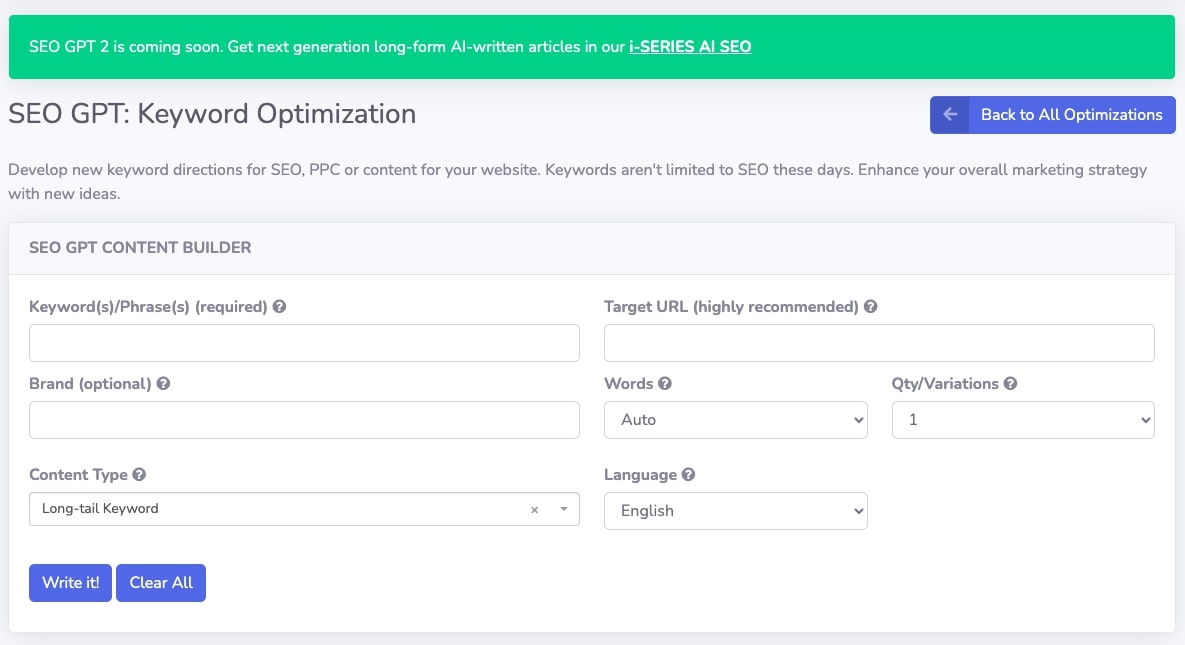
Inputting the Essentials
- Keywords or Phrases: Start by defining the keywords or phrases central to your optimization efforts. You want to rank for or target these terms in your marketing campaigns.
- Target URL: Specify the webpage URL where you intend to use the optimized keywords. This step ensures that your keyword strategy aligns with specific pages on your website.
- Brand Name: Emphasize your brand’s identity and visibility by including its name in the optimization process. This helps reinforce your brand’s presence in search results.
- Word Length: Select the ideal word length for your target keywords. You can choose up to 10 words depending on your keyword type.
- Quantity or Variations: Choose the quantity or variations of optimized keyword options you want to generate. You can select up to 10 different variations, allowing you to diversify your keywords.
- Content Type: Select the keyword type that aligns with your optimization strategy. This step helps customize your keyword research for specific purposes, such as SEO, PPC, or content marketing.
Diverse Keyword Types for Comprehensive Optimization
One of the standout features of SEO GPT’s Keyword Optimization is its ability to provide access to a wide range of keyword types. These include:
Long-Tail Keywords
Long-tail keywords represent a goldmine in digital marketing, offering a direct path to understanding and fulfilling user intent. However, uncovering these specific phrases that match user intent can be daunting. This is where SEO GPT steps in as an invaluable ally in your keyword research journey.
Let’s dive deeper into this concept using a real-life example:
Imagine Vitality Dental, a dental practice nestled in the heart of Nashville, Tennessee, aiming to bolster its online presence and attract more patients. Their initial keyword focus is on the broad term “Nashville Dentistry.” While this base keyword is essential, Vitality Dental recognizes the need to dig deeper and uncover more specific long-tail keywords that can bring in highly qualified leads.
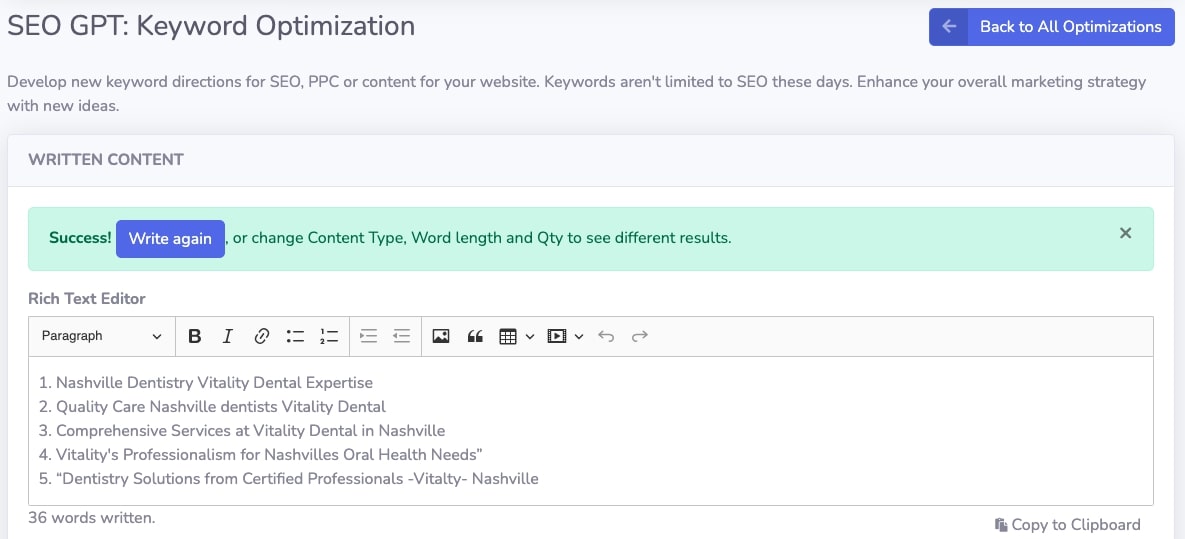
Related Keywords
Related keywords are a fundamental aspect of any comprehensive keyword optimization strategy, and SEO GPT excels in identifying and suggesting these. It allows you to explore keywords closely tied to your primary terms, providing a more holistic view of user intent.
Suppose you’re managing the online presence of “Healthy Eats,” a health-focused meal delivery service. Your primary keyword is “meal delivery service.” With SEO GPT’s assistance, you might uncover related keywords like “organic meal delivery,” “gluten-free meal plans,” or “vegetarian meal subscriptions.” These related keywords help you tailor your content and offerings to specific dietary preferences, attracting a more targeted audience.
Relevant Keywords
Relevant keywords ensure that your content aligns closely with your niche or industry, maintaining the integrity and credibility of your brand. SEO GPT can provide relevant keyword suggestions that are highly context-aware.
Consider “EcoGear,” an eco-friendly outdoor gear company. While their primary keyword may be “sustainable outdoor gear,” SEO GPT can suggest relevant keywords like “eco-friendly hiking equipment suppliers” or “recyclable camp tools and gear.” These suggestions emphasize their commitment to sustainability and resonate with eco-conscious consumers.
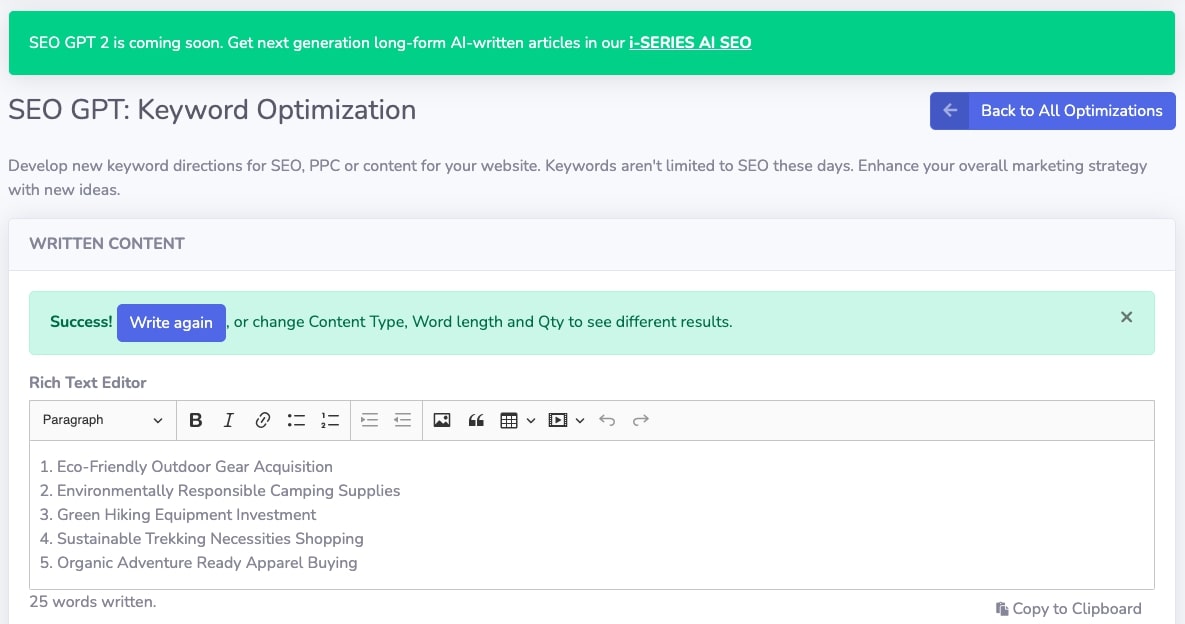
Similar Keywords
Similar keywords allow you to explore different angles of the same topic, broadening your keyword portfolio and content approach. SEO GPT can identify and recommend similar keywords based on your primary keyword.
Imagine “TechTrend,” a technology blog. While their primary keyword may be “smartphones,” SEO GPT can suggest similar keywords like “reliable smartphone solutions,” “high-quality phone designs,” or “latest technology Phones.” These suggestions enable TechTrend to cover various aspects of the tech world, catering to a broader audience.
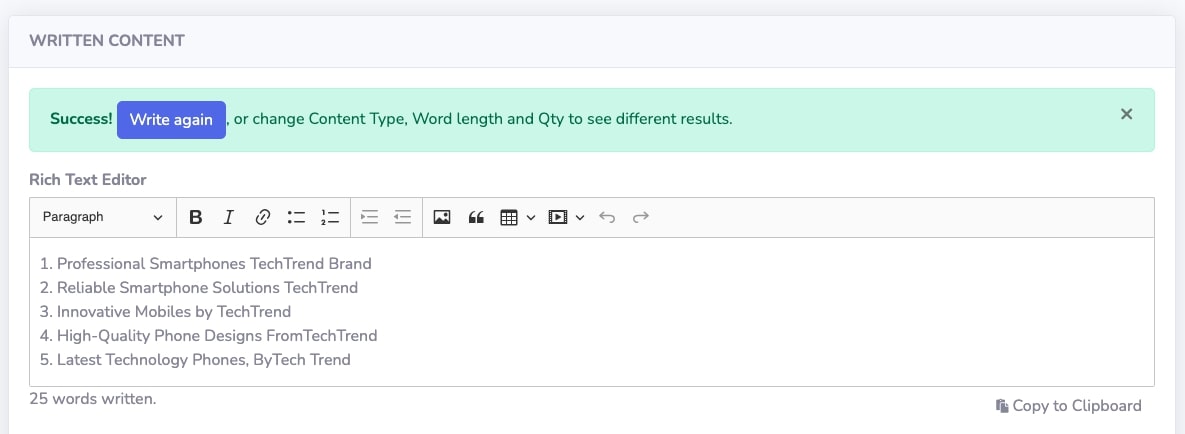
Contextual Keywords
Contextual keywords are vital for seamlessly integrating valuable information within the context of user queries, thereby enhancing the user experience. SEO GPT can assist in identifying and incorporating these contextually relevant keywords.
Suppose you’re managing content for a “DIY Home Improvement” website. In that case, contextual keywords like “efficient and cost-effective home renovation ideas” or “innovative DIY home improvement solutions” can be identified by SEO GPT. These keywords ensure that your content provides information and guides users through practical actions.
Local Keywords
Local keywords are indispensable for businesses serving specific geographic regions, allowing them to target local audiences effectively. SEO GPT can help you identify location-specific keywords for your content.
Consider “The Cozy Café,” a local coffee shop in San Francisco. Local keywords like “San Francisco coffee shops,” “best cafes in the Bay Area,” or “coffee near Golden Gate Park” can be recommended by SEO GPT. These keywords enable The Cozy Café to reach potential customers in their vicinity, driving foot traffic and local sales.
SEO Keywords
SEO keywords are fundamental for improving your website’s visibility and rankings on search engine results pages (SERPs). SEO GPT can suggest SEO-focused keywords that align with your content and optimization goals.
If you’re optimizing a web development agency’s website, SEO keywords like “best web development agency specialists” or “modern website building solutions experts ” can be generated by SEO GPT. These keywords showcase your expertise and attract clients seeking SEO-related services.
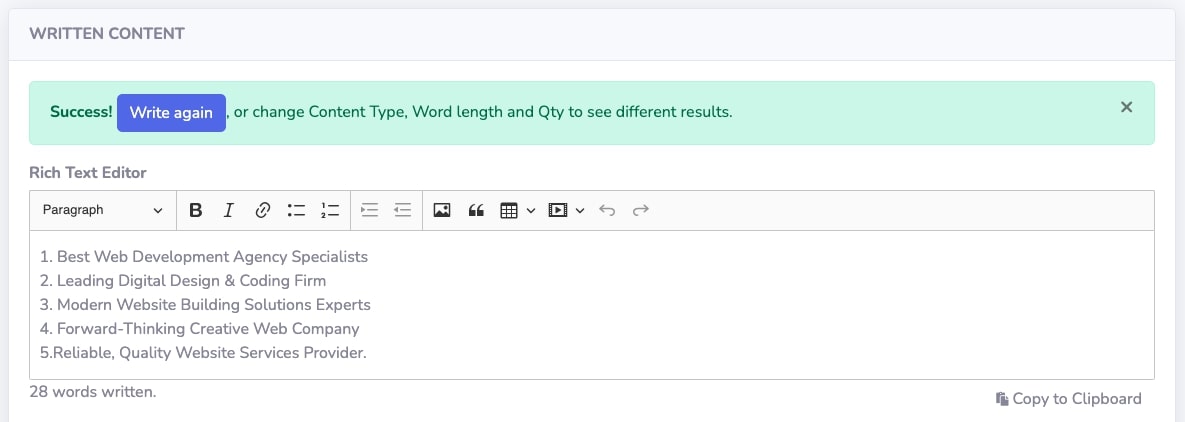
Article Keywords
Article keywords enhance the quality and depth of your blog posts and articles, making them more informative and engaging. SEO GPT can suggest article-focused keywords that bolster your content.
Recommended Keywords
Recommended keywords, often generated by SEO GPT, offer valuable insights and suggestions to refine your keyword strategy based on your specific objectives and target audience.
If you’re marketing a subscription box service for pet owners, recommended keywords might suggest terms like “convenience-packed care kits, tailored just for pets!” or “premium pet owner convenience boxes.” These keyword suggestions help you fine-tune your marketing campaigns to attract the right audience.
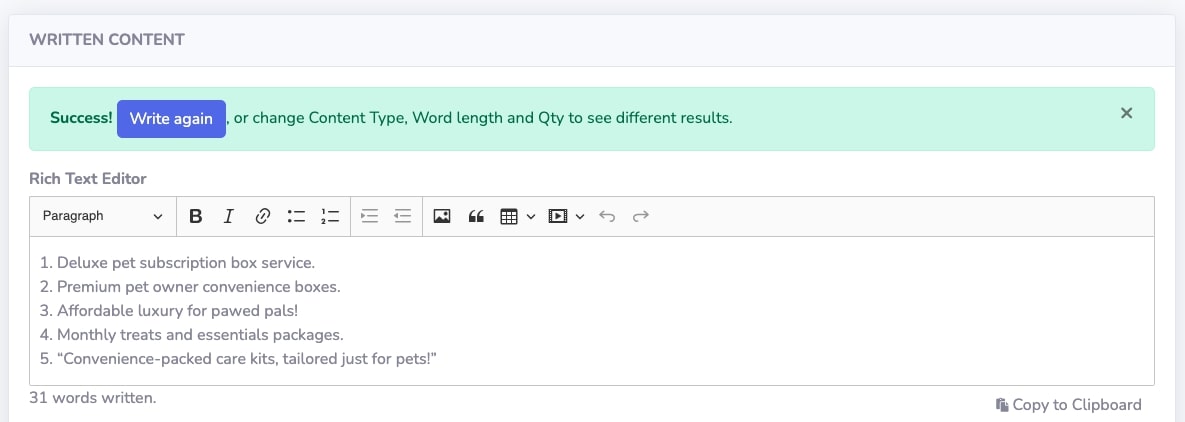
Peripheral Keywords
Peripheral keywords, identified by SEO GPT, expand your keyword reach by considering related concepts, offering a broader perspective on your topic.
Suppose you manage a travel blog, “Wanderlust Journeys.” While your primary keyword may be “solo travel tips,” SEO GPT can recommend peripheral keywords like “intelligent budgeting for singles trips,” “professional solo trip planning,” or “time management techniques while traveling alone.” These keywords allow you to cater to a wider range of travel enthusiasts.
LSI Keywords (Latent Semantic Indexing)
LSI keywords enhance the semantic relevance of your content, making it more contextually rich and comprehensive. SEO GPT can identify and suggest LSI keywords that complement your primary keyword.
For a digital marketing agency, LSI keywords like “comprehensive analysis & optimization assistance,” “experienced online advertising strategies consultation,” or “tailored solutions for digital success ” can be recommended by SEO GPT. These keywords reinforce your expertise and provide a more comprehensive understanding of digital marketing.
Synonym & Antonym Keywords
Synonym and antonym keywords, skillfully suggested by SEO GPT, introduce variations of your target keywords, enriching your content and offering a broader vocabulary spectrum to engage your audience.
Buzzwords
Buzzwords, identified by SEO GPT, keep your content fresh and aligned with the latest industry developments, attracting readers interested in cutting-edge information.
Keyword Map
A keyword map, which SEO GPT can help create, is a visual representation of how various keywords connect and relate to each other in your content strategy.
Keyword Ideas
Keyword ideas inspired by SEO GPT ignite creativity and inspire new content topics and directions for your marketing campaigns.
Related Field/Industry/Profession/Technology
Keywords related to broader fields, industries, professions, or technology pinpointed by SEO GPT help you explore adjacent topics that can resonate with a larger audience and allow you to tap into audiences interested in related areas.
For a nutrition blog, related field keywords like “balanced diets to maintain health and wellbeing,” “tried-and-true recipes to meet dietary needs,” or “nutritional supplements” expand your content reach beyond nutrition enthusiasts.
Meta Keywords
Incorporating meta keywords into your website’s metadata is crucial for improved search engine indexing, and SEO GPT can assist in generating relevant meta keywords.
When optimizing an ecommerce website, SEO GPT can suggest meta keywords like “online shopping,” “ecommerce store,” or “buying products online,” ensuring your site ranks well for relevant search queries.
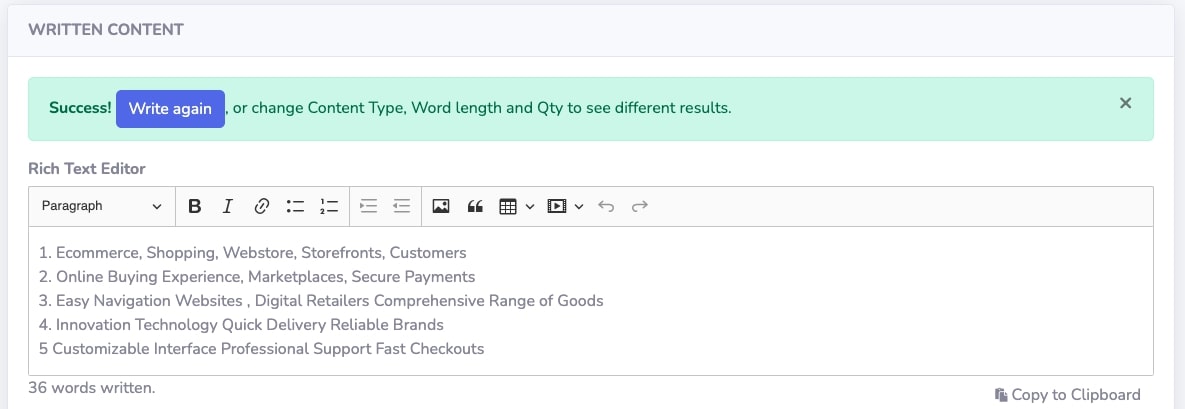
Geo-Targeted Keywords
Geo-targeted keywords, identified by SEO GPT, are essential for businesses aiming to capture local customers by tailoring content to specific geographic locations.
For a real estate agency in Miami, SEO GPT can recommend geo-targeted keywords like “premium properties across the Greater Miami Area,” “broker services in the city of Miami, Florida area,” or “real estate agency in Miami for buying and selling property.” These keywords enable the agency to reach prospective buyers in their target area.
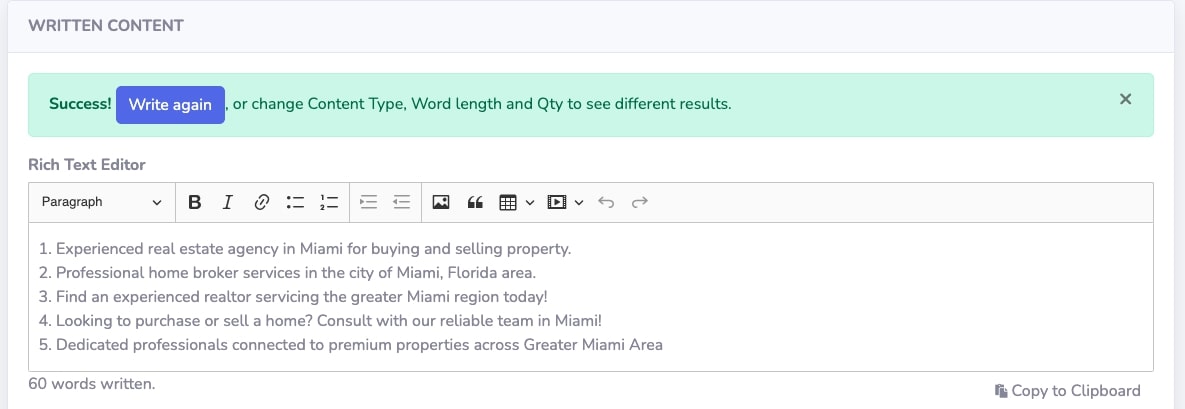
These diverse keyword types provide a comprehensive toolbox for digital marketers to optimize their content, enhance user experience, and reach their target audience effectively, regardless of their niche or industry. By strategically incorporating these keywords, you can elevate your online presence and achieve greater success in SEO, PPC, and content marketing campaigns.


